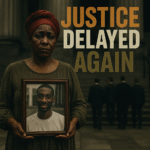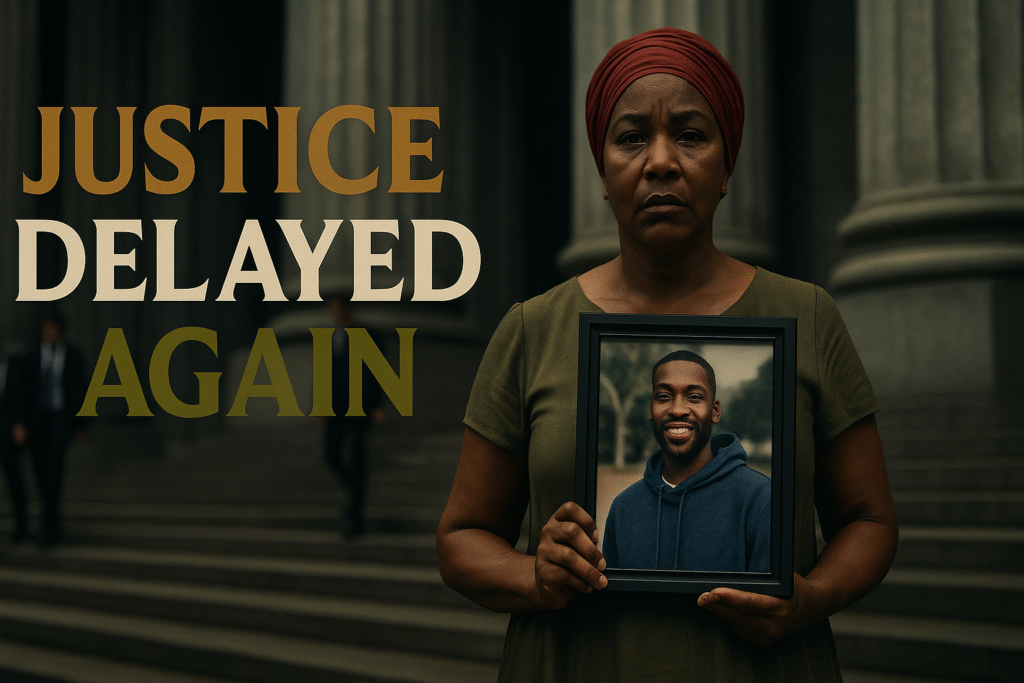

Tyre Nichols Case: A New Trial Ordered
By Darius Spearman (africanelements)
Support African Elements at patreon.com/africanelements and hear recent news in a single playlist. Additionally, you can gain early access to ad-free video content.
Judicial Bias and Retrial
A federal judge has ordered a new trial for three former Memphis police officers. These officers were convicted of obstructing justice in the fatal beating of Tyre Nichols. This decision comes after concerns about potential judicial bias (AP News). U.S. District Judge Sheryl H. Lipman ruled that Tadarrius Bean, Demetrius Haley, and Justin Smith must face a retrial. The charges include federal witness tampering and obstruction of justice (AP News).
The defense attorneys argued that the previous judge, U.S. District Judge Mark S. Norris, showed bias. He allegedly claimed gang affiliations among the defendants. These claims were not supported by evidence presented at trial (AP News). Judge Lipman concluded that “the risk of bias in this case is too significant to be constitutionally acceptable.” Therefore, a retrial is necessary (AP News). This ruling highlights the importance of impartiality in the justice system, especially in cases that deeply impact the African American community.
Recusal and Delays
The original federal judge in the case, Mark Norris, recused himself just days before the scheduled sentencing of the officers (AP News). Judge Norris issued a brief order on June 13, 2025, stating his recusal (AP News). He had overseen the case since federal indictments were issued in September 2023. He also accepted guilty pleas from two officers and presided over the trial for the other three (CBS News).
Judge Norris did not provide a reason for his recusal in any public records (WKNOFM). However, some documents were filed under court seal before sentencing. The recusal happened just days before four of the five officers were to be sentenced (CBS News). This unusual move caused significant delays and uncertainty in the legal process. It also raised questions about the transparency of judicial proceedings.
Understanding Judicial Recusal
Judicial Recusal: This refers to a judge stepping down from a case. It happens when there is a conflict of interest or a perception of bias. The goal is to ensure fairness and impartiality in the courtroom. In the Tyre Nichols case, Judge Norris's recusal led to delays and a new judge being assigned, impacting the entire legal timeline.
New Judge, New Timeline
The recusal of Judge Norris led to a delay in sentencing and the appointment of a new judge (AP News). U.S. District Judge Sheryl H. Lipman was assigned to the case (AP News). Judge Lipman scheduled new sentencing dates for the five officers for the week of December 15, 2025 (AP News). She noted that these dates could change or be canceled. This depends on her rulings on several sealed motions, including one for a new trial for three of the men (AP News).
Judge Lipman stated she could rule on the pending motions by mid-September (AP News). The delay in sentencing affects the officers, the victim's family, and the community. It prolongs the emotional toll and the wait for justice. The legal process, while designed for fairness, can sometimes be slow and complex. This case, in particular, has seen many twists and turns, keeping the community on edge.
Federal Versus State Charges
The three officers facing a retrial, Bean, Haley, and Smith, were previously acquitted of state murder charges (Al Jazeera). On May 7, 2025, a jury acquitted them of state-level charges. These included second-degree murder, aggravated assault, aggravated kidnapping, official misconduct, and official oppression (Al Jazeera, CNN). This was their second criminal trial. They had also faced federal charges for Nichols’s death (Al Jazeera).
In the federal case, these three officers were acquitted of the most serious charges. However, they were found guilty of witness tampering. This was for allegedly attempting to cover up the beating (Al Jazeera). Federal charges are brought by the U.S. government for crimes violating federal law. State charges are brought by a state government for crimes violating state law. Separate trials occur because the same act can violate both federal and state laws, allowing for prosecution in both jurisdictions (CNN). This dual prosecution highlights the complexity of the American legal system and its impact on cases involving police misconduct.
Current Status of Officers in Tyre Nichols Case
Tadarrius Bean
Acquitted of state murder charges. Federal witness tampering and obstruction of justice convictions overturned; new trial ordered.
Demetrius Haley
Acquitted of state murder charges. Federal witness tampering and obstruction of justice convictions overturned; new trial ordered.
Justin Smith
Acquitted of state murder charges. Federal witness tampering and obstruction of justice convictions overturned; new trial ordered.
Emmitt Martin
Pleaded guilty to federal charges. Sentencing pending.
Desmond Mills Jr.
Pleaded guilty to federal charges. Sentencing pending.
Plea Deals and Accountability
Two other officers involved in the Tyre Nichols case, Emmitt Martin and Desmond Mills Jr., pleaded guilty to federal charges (CNN). These former Memphis officers did not stand trial in state court. This was because they agreed to plea deals with prosecutors (CNN). They also pleaded guilty in federal court. Sentencing for all five officers is pending (CNN).
Plea deals are agreements between prosecutors and defendants. The defendant pleads guilty to a lesser charge or to one of several charges. In return, the prosecutor drops other charges or recommends a lighter sentence. These deals are often used to avoid lengthy trials and ensure some form of conviction. However, they can also leave some in the community feeling that full justice has not been served. The outcomes of these plea deals will be closely watched, as they contribute to the overall narrative of accountability in this high-profile case.
The Tyre Nichols Case Background
Tyre Nichols was a 29-year-old Black man. He died in January 2023 after being fatally beaten by Memphis police officers (CBS News). The incident began with officers pulling Nichols from his car. They then pepper-sprayed and tased him (CBS News). This brutal encounter, captured on video, sparked national outrage and protests. It also reignited discussions about police brutality and systemic racism within law enforcement.
Five former officers were convicted in the federal case (CBS News). Three were found not guilty in the state trial (NPR). The defense in the state trial introduced evidence of items found in Nichols' car. This included a small amount of a hallucinogenic drug and credit/debit cards not in his name (NPR). However, the core issue remains the excessive force used by the officers. The case continues to be a focal point for civil rights advocates. It underscores the ongoing struggle for police accountability and justice for Black communities.
Key Events in the Tyre Nichols Case
January 2023
Tyre Nichols fatally beaten by Memphis police officers.
September 2023
Federal indictments issued against officers.
May 7, 2025
Three officers acquitted of state murder charges.
June 13, 2025
Judge Mark Norris recuses himself from the federal case.
August 29, 2025
Judge Sheryl H. Lipman orders new federal trial for three officers.
December 15, 2025 (Scheduled)
New sentencing dates for all five officers in federal case.
Implications for Justice and Community
The order for a new trial for three officers in the Tyre Nichols case carries significant implications. For the Nichols family, it means a prolonged wait for finality and justice. The constant legal proceedings can be emotionally draining. For the community, especially the African American community, this case is a symbol. It represents the ongoing fight against police brutality and for accountability.
The allegations of judicial bias and the subsequent recusal of a judge highlight critical issues within the legal system. It emphasizes the need for transparency and impartiality in all court proceedings. The outcome of this retrial will be closely watched. It will shape public perception of justice for victims of police violence. It will also influence future efforts to reform law enforcement practices across the nation.
The case also brings to light the concept of “sealed motions.” These are court documents that are not accessible to the public. They are kept confidential for various reasons, such as protecting sensitive information or ongoing investigations. While necessary in some instances, the use of sealed motions can also fuel speculation and distrust. This is especially true in high-profile cases like Tyre Nichols'. The lack of public access to certain details can make it harder for the community to fully understand the legal process and its outcomes. This further highlights the tension between legal confidentiality and public demand for transparency.
The broader impact of this delay in sentencing extends beyond the courtroom. It affects the healing process for the family and the community. When justice is delayed, it can feel like justice denied. The repeated legal battles can also erode public trust in the system. Many hope that the retrial will bring a clear and just resolution. This case remains a crucial test of the justice system's ability to deliver accountability for police misconduct.
ABOUT THE AUTHOR
Darius Spearman has been a professor of Black Studies at San Diego City College since 2007. He is the author of several books, including Between The Color Lines: A History of African Americans on the California Frontier Through 1890. You can visit Darius online at africanelements.org.
